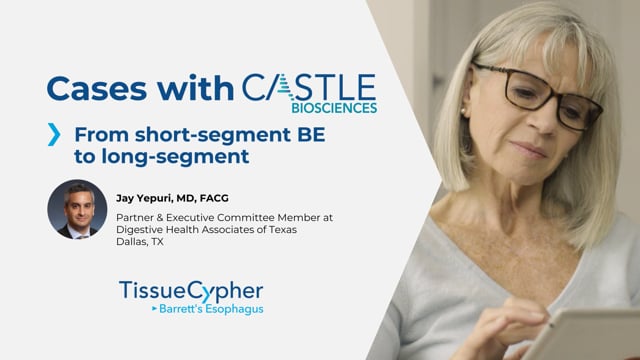Dr. Jay Yepuri: Case 2
A patient with multiple EGDs and conflicting endoscopic findings
This case of a 75-year-old female required Dr. Yepuri to weigh multiple conflicting data points to recommend the best care for an anxious patient.
"TissueCypher allows us to hone in on what the most relevant factors for consideration of eradication therapy for this patient were... and allow us to take that to a patient who had a lot of anxiety around undergoing multiple invasive procedures."


Clinical risk factors
A 75-year-old female patient with existing BE was referred to Dr. Yepuri for consideration of EET. The patient and her family had anxiety about the treatment, but were open to a thoughtful discussion.
Endoscopic findings
Prior to meeting Dr. Yepuri, the patient had several prior EGDs. Two endoscopy reports noted a C1M0 length of non-dysplastic BE. A third EGD revealed a 6 cm length of non-dysplastic BE with a large hiatal hernia. Given these conflicting data points, Dr. Yepuri conducted his own EGD, finding a C10M10 segment of BE. WATS3D pathology confirmed the absence of detectable dysplasia.
| Prior EGD | Subsequent EGD | Latest EGD |
|
|
|
Traditional management
|
Traditional management
|
Traditional management
|
TissueCypher results
TissueCypher results provided Dr. Yepuri with very important additional information regarding this patient’s personal progression risk. Given a high-risk TissueCypher classification and associated 17 percent probability of progression within 5 years, this patient had a much higher individual risk than the overall population of patients with non-dysplastic BE . Paired with her very long segment length, the TissueCypher results helped the patient and her family choose to proceed with EET.
- Risk class: High
- Risk score: 7.1
- 5-year risk of progression: 17%
TissueCypher-guided management
- Change in management: Upstaged to EET

"TissueCypher allowed us to sort through a lot of complex information - a lot of complex clinical and non-clinical data - to be able to make a really focused recommendation to this patient based on her own individual factors and risk."
Jay Yepuri, MD, FACG


